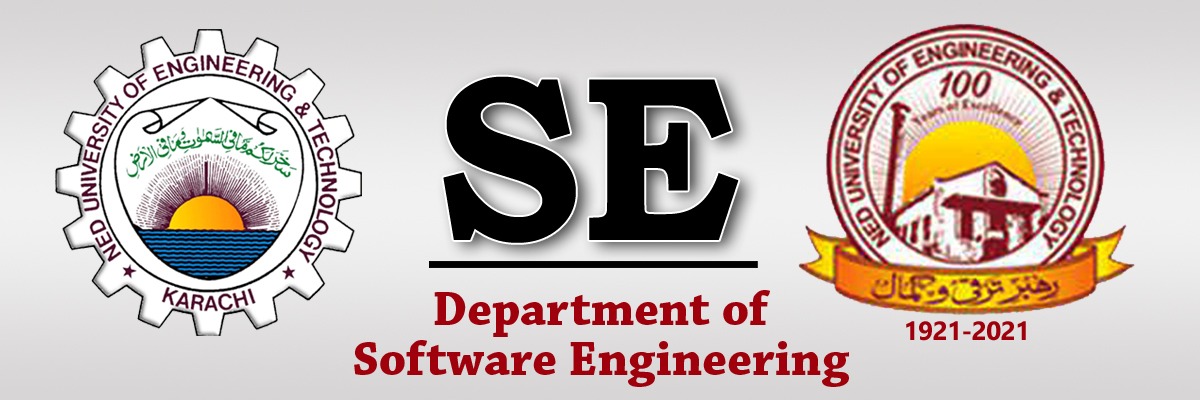Department Vision
To be a leading Department in Software Engineering recognized in professional industry for the caliber of its graduates, and to contribute effectively towards the Software Engineering discipline.
Programme Mission
To produce professionals having sound knowledge and understanding of Software Engineering domain to satisfy the demands and challenges of Software Engineering field, and who are aware of their social and ethical responsibilities.
Program Educational Objectives (PEOs)
PEO-1: Empower graduates to master software engineering knowledge, skillfully tackle complex problems, design solutions considering various factors, and systematically investigate intricate challenges, fostering their competence as professional engineers.
PEO-2: Prepare graduates to proficiently apply modern engineering tools, consider ethical responsibilities, assess societal and environmental impacts, and address complex software engineering challenges in a manner that aligns with professional ethics, and societal well-being.
PEO-3:Facilitate the ability of graduates to function effectively both as individuals and within diverse, cross-functional teams, while also equipping them with the skills and motivation to stay updated on the latest developments in the fields of software engineering and computing through ongoing professional growth and lifelong learning.
PROGRAM LEARNING OUTCOMES (PLOs)
PLO-1 Engineering Knowledge: Apply knowledge of mathematics, natural science, engineering fundamentals and Engineering specialization to the solution of complex engineering problems.
PLO-2 Problem Analysis: Identify, formulate, conduct research literature, and analyze complex Engineering problems reaching substantiated conclusions using first principles of mathematics, natural sciences and engineering sciences.
PLO-3 Design / Development of Solutions: An ability to design solutions for complex engineering problems and design systems, components or processes that meet specified needs with appropriate consideration for public health and safety, cultural, societal, and environmental considerations.
PLO-4 Investigation: Conduct investigation of complex Engineering problems using research-based knowledge and research methods, including design of experiments, analysis and interpretation of data, and synthesis of information to provide valid conclusions.
PLO-5 Tool Usage: Create, select and apply appropriate techniques, resources, and modern engineering and IT tools, including prediction and modeling, to complex Engineering problems, with an understanding of the limitations..
PLO-6 The Engineer and the World: Analyze and evaluate sustainable development impacts to society, the economy, sustainability, health and safety, legal frameworks, and the environment while solving complex engineering problems.
PLO-7 Ethics: Apply ethical principles and commit to professional ethics and norms of engineering practice and adhere to relevant national and international laws. Demonstrate an understanding of the need for diversity and inclusion.
PLO-8 Individual and collaborative Teamwork: Function effectively as an individual, and as a member or leader in diverse and inclusive teams and in multi-disciplinary, face-to-face, remote and distributed settings.
PLO-9 Communication: Communicate effectively and inclusively on complex engineering activities with the engineering community and with society at large, such as being able to comprehend and write effective reports and design documentation, and make effective presentations, taking into account cultural, language, and learning differences.
PLO-10 Project Management and Finance: Demonstrate knowledge and understanding of engineering management principles and economic decision making and apply these to one’s own work, as a member and leader in a team, to manage projects in multidisciplinary environments.
PLO-11 Lifelong Learning: Recognize the need for, and have the preparation and ability for i) independent and life-long learning ii) adaptability to new and emerging technologies and iii) critical thinking in the broadest context of technological change.
MAPPING OF PLOs TO PEOs
| PLOs | PEOs | ||
| PEO-1 | PEO-2 | PEO-3 | |
| PLO 1: Engineering Knowledge | X | ||
| PLO 2: Problem Analysis | X | ||
| PLO 3: Design / Development of solutions | X | ||
| PLO 4: Investigation | X | ||
| PLO 5: Tool Usage | X | ||
| PLO 6: The Engineer and the Workd | X | ||
| PLO 7: Ethics | X | ||
| PLO 8: Individual and CollaborativeTeam Work | X | ||
| PLO 9: Communication | X | ||
| PLO 10: Project Management and Finance | X | ||
| PLO 11: Lifelong Learning | X | ||
